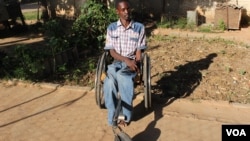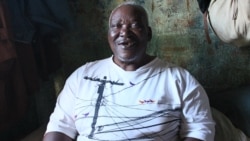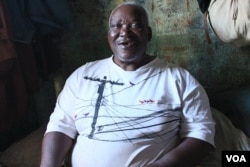People with disabilities say commemorating 36 years of independence from colonial rule should also be a time for Zimbabweans to reflect on the numerous challenges that the disabled face.
Programs officer of the National Association of Societies for the Care of the Handicapped, Tsarayi Mungoni, says while Zimbabweans were liberated politically, many still a negative attitude towards people with disabilities.
He says there need for a systematic approach to educate communities to safeguard the dignity of such individuals.
“They tend to protect family members with disabilities thinking that they cannot go to school. As they interact with other children they feel face the risk of being stigmatized, being harmed psychologically. So you find that they are always kept at home. So children with disabilities tend to grow up a negative self-concept.”
Mungoni, who is blind, says over the years blind children have been denied relevant reading materials. He says this is contrary to the sustainable development goals which call on governments to ensure inclusive and quality education for all citizens.
“Some mathematics is presented in pictorial or diagrammatical form including some science subjects. Given the fact that in Zimbabwe there is an acute shortage of Braille reading material children with visual impairment have to rely on sighted colleagues who read out to them books in conventional print. This challenge straddles to higher education where some institutions insist on mathematics as an entry requirement into some programs.”
Mungoni says if independence is to have meaning for people with disabilities, government should put together a ministry for such people, as is the case in Uganda, Botswana and South Africa. He said this will ensure that all government policies are sensitive to the needs of the disabled.
Twenty-eight year-old Hedwig Machina, who is disabled in both legs and uses a wheel chair, shares the same views. She says Zimbabweans should respect the constitution which states that people with disabilities should have equal access to education.”
"Most of the schools are not accessible especially in the rural areas. In towns there is the problem of accessibility to toilets and offices because of steps. If you want to go and see your teacher or lecturer you won’t be able to go by yourself. You will need someone to assist you. In rural areas it will actually be an issue for someone to move from home to where the school is because the schools may be kilometers away from home."
Machina says people still discriminate against those with disabilities 36 years after independence. She says there are very few educational programs to educate society on this issue.
“People have been taught about HIV and homosexuality. Everyone knows they can meet a lesbian, they can meet someone with HIV and treat them equally. If films could be produced in Zimbabwe let’s see someone with a disability participating in those films. If there is to be any opportunity in any field let someone be employed in that field who has a disability. That way people will be educated about disabled persons.”
Sixty eight-year-old Harare resident, Edward Chideme, who is disabled in both legs, is confined to his house because his shoes, calipers and wheelchair have worn out. He cannot afford to buy them because he is unemployed. One needs to pay one hundred dollars to have a pair of shoes made at Parirenyatwa’s Orthopedic Centre. A pair of calipers cost $150.
Chidema says government should address the crisis facing many like him who have been rendered immobile due to lack of assistive devices.
“That’s the biggest problem because our shoes appear ordinary when people look at us but my shoe has to be specially done so that I move and not get problems. But now I am forced to get an ordinary shoe, try to fix the socket and move, but I will be putting myself in danger. The wheel chair is new when you get it but the wheels are now worn out, repairs are needed and you are just sitting down. You can’t go to the groceries because you can’t move with a thing that is not working.”
Chideme says Government officials need to change their mindset because they are reluctant to meet people with disabilities over their problems.
“When you hear so and so is in the area you try to force yourself in their presence, but you know how people are. Sometimes you end up turning back. But I have made applications through the chairman of my cell who has promised to take word to them but nothing happened. I am complaining because I am a citizen of Zimbabwe. I still look forward to meeting them.”
His brother Patrick says young people should be freed from the mentality of thinking that those with disabilities should be secluded from society.
“Very few people consider disability especially when we look at the young generation. They definitely think the disabled are a different nation, we are just but one people. I think the government should put this occasion into consideration. If the government just puts these guys into consideration I think things will be okay on their side. Very few of them have the chance to be somewhere or being interviewed like we are doing.”
Director of the Albino Charity Organisation of Zimbabwe, Loveness Mainato, says she is concerned government has not made efforts over the past decades to produce cheap locally-made sunscreen lotions. People with albinism require sunscreen lotions to protect their skin from the harmful effects of the sun. The World Health Organisation says persons with albinism in Africa are deprived of basic health care services vital for their survival. Mainato says as a first step government should reduce the cost of importing the lotions.
“These sunscreen lotions are being charged duty and we need them in the morning, afternoon and evening. One tube lasts three weeks to a month. One tube costs 20 dollars and above and this means you need 40 or 50 dollars per month. You can imagine how expensive it is since these lotions are charged duty.”
Mainato says government should also develop appropriate strategies for assisting people with albinism such as integrating albinism awareness in the school curriculum.







